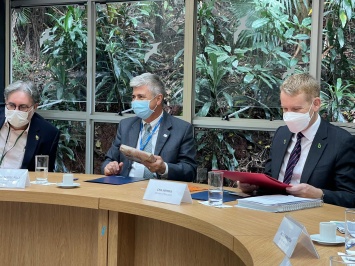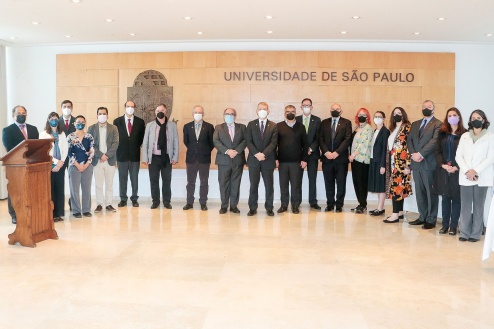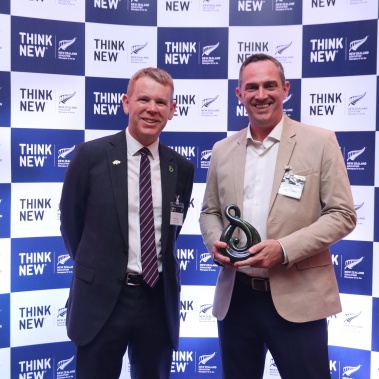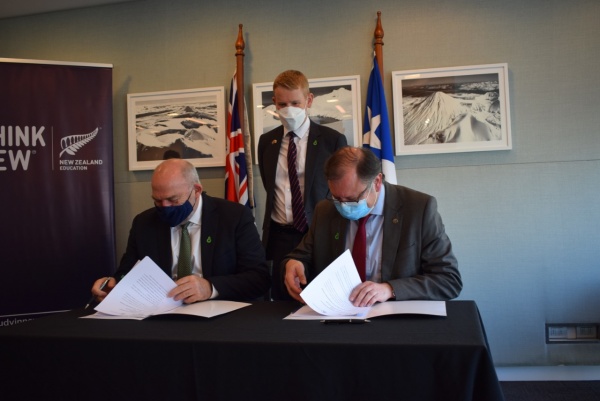Search
Showing 10 of 1803 results for NARSC 2016 July student registration fees
-
New Zealand and China internationalise higher education
Held at the University of Auckland, the seminar was organised by Universities New Zealand (UNZ) in partnership with the Chinese Education Association for International Exchange (CEAIE) and sponsored by ENZ.
It comprised panel discussions and presentations focused on promoting student mobility between New Zealand and China.
Representatives from all eight New Zealand universities, 35 Chinese universities, the Chinese Embassy, Confucius Institute, the New Zealand and Chinese Ministries of Education, Ministry of Business, Innovation and Employment and ENZ attended the seminar.
Ross Fisher, ENZ’s International Market Manager for China, said the HES gave delegates an opportunity to gain new insights and contacts for building a strategic education partnership between New Zealand and China.
“New Zealand universities shared their strategies on encouraging more New Zealand students to study abroad, particularly in countries whose long-term futures aligned with New Zealand’s trade and economic interests,” said Ross.
“Chinese universities provided some very interesting updates on their efforts to increase their attractiveness to international students, focused on the theme of creating multi-national learning environments through such things as the development of courses taught in English.
“It was also interesting to hear the perspectives of the Chinese delegates on the role of education in developing deeper person-to-person linkages as part of China’s One Belt-One Road initiative.”
Prime Minister’s Scholarship for Asia (PMSA) recipients took part in a panel discussion of the opportunities, barriers and challenges of studying in China.
To conclude the seminar, delegates participated in a business matching and networking session.
Adele Bryant, ENZ Regional Director – Greater China and North Asia, said the seminar held a lot of potential for further internationalisation.
“China is a major education destination, and hosted more than 440,000 international students in 2016,” said Adele.
“We hope this visit by some of China’s best universities will encourage New Zealand students to look at a wider range of study abroad partners in China, and will open doors for New Zealand universities seeking exchange and joint programme partners.”
-
Around the world in five
US
Hawaii: From holiday destination to educational hub?
A campaign by the Study Hawaii Educational Consortium aims to double international student numbers by 2026. Several countries across Asia as well as Brazil, Norway and Germany have been highlighted as priority markets.
EUROPE
Europe’s ambition to double Erasmus+, boost language skills
The European Commission wants to double the number of Erasmus+ participants by 2025 and ensure schoolchildren within the EU learn two languages beyond their mother tongue.
CHINA
E-sports: How China’s video gamers went from couch to classroom to career
China’s Ministry of Education added e-sports as a new major in higher education last year, and at least 20 Chinese colleges and vocational schools have since begun offering e-sports studies.
JAPAN
English test requirement for university sparks debate
New government plans for reform of Japan’s university admissions examination system will require students to pass a new standardised English test in 2020. The move has sparked strong but mixed reactions among higher education institutions, including over the use of privately run tests.
THE NETHERLANDS
Foreign enrolment in the Netherlands reaches a record high in 2016/17
The Netherlands now hosts more than 112,000 international students, two-thirds of whom are pursuing full degree programmes. In addition, international degree students represented 164 different nationalities, marking five straight years of a trend toward greater diversity.
-
China experts to speak at Business Forum

The second annual South Island Lantern Business Forum will be held on 9 March and is run by ChristchurchNZ, in partnership with Canterbury Employers’ Chamber of Commerce.
The international keynote speaker for 2018 is Duncan Innes-Ker, The Economist Intelligence Unit (EIU) Regional Director, Asia & Australasia. Duncan, who is based in Hong Kong and a frequent commentator for the BBC and CNN, will speak on the way in which key policies and customer trends in China will shape how businesses will interact and engage with the Chinese market.
Also speaking is Dr Bill Liu, successful founder and CEO of Royole Corporation – a Silicon Valley, Hong Kong and Shenzhen-based company that develops rollable displays for smartphones, computers and televisions. His presentation aims to demystify the maze of investor funding and financing options available for companies wanting to make the big leap to manufacturing in China.
Following the forum is a number of workshops, including one on ‘The Future of The China International Education Market’ led by Shelly Xu, ENZ’s Market Development Manager, based in Shanghai.
Shelly will discuss trends in China student mobility, preferred overseas study destinations and subject choices, and trends in technology adoption in the Chinese education system.
“Knowing how to approach agents and students in China, and understanding the trends in international education demand will help education providers engage more effectively in the market” said Shelly.
“This Forum provides an opportunity for education providers and exporters to network and explore opportunities to leverage from each other’s activities in China.”
International students from China are valued at around $1.55 billion to New Zealand. In 2016, 2,923 Chinese students studied in the Canterbury region. This has grown by 82% since 2012, speaking to the quality and relevance of Canterbury’s international education offering for the Chinese market.
For more information or to register, click here.
-
The Education New Zealand Journalism Fellowship for US students
An independent report from the Economist Intelligence Unit recently ranked New Zealand’s education system as the best in the world for preparing students for the future.
All eight of our universities are ranked in the top 2.5% of the world (QS World University Rankings 2018) and New Zealand has the seventh highest performing graduates in the world, ahead of graduates from many elite universities in the US, Canada and England (2016 OECD Programme for the International Assessment of Adult Competencies).
Education New Zealand will work with recipients to structure a programme of interviews and visits that most interest you, and can help suggest potential story ideas and angles and interviewees.
We will cover the cost of return economy class flights from the US, internal travel within New Zealand, shared meals and accommodation. Recipients will also have the opportunity to experience some uniquely New Zealand cultural and environmental visits.
Students will be expected to produce at least two news stories or one feature article, to be published in the US.
The student who is most successful in placing their stories will also be awarded the prestigious Top Education New Zealand Journalism Scholar award, and US$500.
Who can apply?
Students currently enrolled in US institutions or recent graduates working for media outlets. Applicants who are not working for publications should either be enrolled in a journalism programme and/or write for media outlets. Successful applicants must be available to travel to New Zealand for a week in June, 2018.
For more information please email: Lucy.Johnston@enz.govt.nz
Click here to apply.
-
International students get work ready in Welly
Several times a year, Wellington Regional Economic Development Agency (WREDA) offers a free Work Ready in Wellington programme to help prepare international students and graduates for work in New Zealand.
Since 2016, some 600 students have completed the course, which covers CV preparation, job search strategies, interview techniques, employee rights and more. Specialist tutors teach a range of topics such as the importance of communicating in the New Zealand workplace including small talk.
WREDA’s Talent, Skills and Education Manager Brook Pannell said the programme gives international students a clear picture of what is appropriate in the Kiwi workforce.
“That sounds intuitive to New Zealanders but there are a wide range of norms in business behaviour and expectations around the world. We want to show students the Kiwi way to kickstart their careers in Wellington,” he said.
Course coordinator Nicky Riddiford said engaging in small talk in a new workplace is an important element of fitting in.

“It’s important to engage in small talk but it is often more challenging for newcomers because they are not sure which topics are suitable, and who they should do small talk with,” she said.
Chinese international student Allen (Feng) Zhu graduated from Massey University before completing a Work Ready course in 2017. He then worked as an intern at WREDA’s head office for a month before starting his current role at the Ministry of Health.
“Being able to quickly fit into a new workplace is something employers look for and having the confidence to chat with colleagues about everyday things is important.
“Small talk was a good thing to learn about as part of the Work Ready programme.”
-
Around the world in five
UNITED KINGDOM
UK government announces fast track visa plan for top researchers
New visa regulations designed to attract the world’s top scientific researchers will be announced later this year.
GLOBAL
Why more international students are attending Australian schools
The number of international students at Australia’s international schools is up 11 percent from 2016.
GLOBAL
Better than rankings: three more meaningful metrics for choosing a university
While university rankings play an influential role for any prospective student choosing a university, there are many other factors that contribute to a meaningful tertiary experience.
GLOBAL
The link between employment outcomes and recruiting
Employability is now a top priority among international students when planning for study abroad.
UNITED STATES
Eliminating achievement gaps in tertiary education
Taking a systems approach driven by data, Georgia State University (GSU) managed to eliminate achievement gaps based on ethnicity and income.
-
Kiwi scholars to gain international skills
The scholarships, funded by the New Zealand Government and administered by Education New Zealand, support recent graduates or current students to undertake study, research or internships at institutions in Latin America and Asia, including Brazil, Mexico, China, India and Japan.
Awardees in this round (2019-2020 Round Two) are in fields including languages, law, business, health, sustainability and the arts. They will attend for periods ranging from four weeks to one year.
The scholarships enable a wide range of educational experiences, including: a cultural exchange and internship programme for Māori and Pasifika graduates in Vietnam; a group of arts and design students who will attend a course on the economic and cultural significance of modest fashion at the Islamic Fashion Institute in Indonesia; and an internship with an Indian charity supporting the health and education of street children in Jaipur.
‘’A key aspect of international education is sending New Zealand learners out to the world to gain all-important global skills and experience,’’ says ENZ’s Director Student Experience and Global Citizens, Partnerships and Marketing, Sahinde Pala.
“When they return, they bring new perspectives and expertise with them, helping to grow New Zealand’s international networks and inter-cultural awareness.’’
Most awardees undertake programmes that can be credited back to their New Zealand qualification. Similarly, international internships are usually part of their home institution’s work integrated learning programme, Sahinde says.
Background
PMSA and PMSLA support the Government’s International Education Strategy: to build a thriving and globally connected New Zealand through international education.
A total of 2,399 young New Zealanders have taken part since the programme was launched in 2013, initially for Asia (PMSA), and extended to Latin American (PMSLA) in 2016.
The full list of PMSA and PMSLA recipients from this round is on the Education New Zealand website: PMSA recipients and PMSLA recipients. Information on past PMSA and PMSLA recipients can be found here.
How to apply
There are two rounds of PMSA and PMSLA scholarships offered each year, in August and March.
Applications for the next PMSA and PMSLA round (2019-2020 Round Two) open from mid-January 2020 and close on 30 March 2020. More information on the application process can be found on our website. Institutions are encouraged to contact ENZ to discuss potential group applications.
-
Teaching the teachers
The School Influencers Workshop series focuses on new ideas in Early Childhood Education, English Language teaching and educational management and leadership. Originally planned to be delivered in-person, this is the first time the course will be held online.
Members of the UC College of Education, Health and Human Development will deliver the online courses to more than 100 education practitioners and administrators alongside in-market organisations Teach for Indonesia and Teach for the Philippines.
UC Associate Dean (International), Dr Stuart Wise, said “The College of Education, Health and Development at the University of Canterbury is delighted to support this initiative sponsored by Education New Zealand. We are very keen to support our colleagues at Teach for Indonesia and Teach for Philippines are looking forward to the opportunity to engage with course participants and share some of our expertise with them.”
The professional development of teachers has been a key part of ENZ’s South East Asia engagement strategy since 2016.
“The School Influencers Workshop series gives teachers and administrators a taste of New Zealand’s top-quality education by offering an insight into our hands-on teaching methodologies and contact with top academics,” ENZ Market Manager Indonesia, Malaysia and Philippines, Desiree Lee, said.
“Teachers, counsellors and school leaders remain a key group of influencers in a student’s study journey. They are an important group which ENZ will continue to engage as the international education sector recovers from COVID-19.”
Read the UC story on the Schools Influencers Workshop series
-
Building relationships in Brazil and Chile
The visit was an opportunity to highlight that New Zealand is reconnecting with the world, increase the visibility of New Zealand’s education offering, strengthen bilateral and system connections, and boost the visibility of New Zealand as a preferred destination for students from Brazil and Chile.
During the visit, Chris Hipkins highlighted New Zealand’s unique, high-value education offering, met with counterparts to support bilateral relationships, and connected with education agents, alumni, and New Zealanders based offshore. He also made clear that New Zealand valued the depth of the education relationship in each country, and his interest in continuing these relationships.
The New Zealand delegation included Grant McPherson, Chief Executive of Education New Zealand Manapou ki te Ao (ENZ); Lisa Futschek, ENZ’s General Manager International; Freddy Ernst, Senior Policy Manager International Education from the Ministry of Education; and Jacque Bernstein, Senior Private Secretary. In Brazil and Chile, Chris Hipkins was also accompanied by Matthew O’Meagher, Director for the LatAm Centre of Asia-Pacific Excellence and ENZ in-country representatives Amy Rutherford, Javiera Visedo, and Bruna de Natale.
There was a significant media coverage following the visit, including an interview with O Estado de São Paulo, a major nationwide Brazilian media outlet, and a television interview with Pablo Cuellar from Mega Channel, Chile, to promote New Zealand education.
“We would love to see more Brazilians coming to study in New Zealand,” Chris Hipkins said during one of these interviews.
Brazil visit

Minister Hipkins with Ronaldo Aloise Pilli – Vice-president / Board of Trustees FAPESP (on his left) and Carlos Américo Pacheco – Executive Board Executive Director FAPESP.
The programme in Brazil included meetings with Patrick Tranjan, São Paulo State Under Secretary of Education, to discuss São Paulo-New Zealand education cooperation and present New Zealand as an education destination for high school students, and with Fundação de Amparo à Pesquisa do Estado de São Paulo (São Paulo Research Foundation, FAPESP) to demonstrate high level New Zealand Government support for growing New Zealand-São Paulo research engagement.

Chris Hipkins and delegation meeting representatives from São Paulo State Universities: USP (Carlos Gilberto Carlotti Junior, Provost), UNICAMP (Marcos Travassos Romano, Pro-Rector of Research) and UNESP (Amadeu Moura Bego, Adviser to the Dean of Undergraduate Studies)
Chris Hipkins also attended an event with New Zealand education agents, alumni, institutions, and business contacts, and visited the University of São Paulo (USP) which included a meeting with key stakeholders from the Council of Deans of São Paulo State Universities.
“It is absolutely brilliant that our Government is demonstrating such strong support to grow research engagement between our two countries, and that our Minister considers agent engagement and alumni as being key to futureproofing our industry,” Ms Futschek says.

Minister Hipkins and Alexandre Argenta, BELTA President, holding the Piko Iti gifted during the reception in São Paulo for agents and alumni.
The visit to São Paulo was a recognition of the value of international education relationships, and the potential for New Zealand to grow our education partnership with Brazil. Prior to the COVID-19 pandemic, Brazil was New Zealand’s largest source of international students from Latin America. Institution-to-institution relationships are particularly strong, with longstanding partnerships and research collaborations. The Prime Minister’s Scholarships for Latin America are a valuable part of this relationship – of the 400 New Zealanders funded through these scholarships, 109 have been for study in Brazil.
During his visit, Chris Hipkins noted the warmth shown towards New Zealand by Brazilian universities, and the benefits of developing a dual focus. All universities mentioned their growing education engagement with New Zealand institutions, and their wish to further develop this cooperation.
USP’s willingness to consider a “New Zealand Corner” in their International Office demonstrates the success of the investment ENZ has made in its internationalisation focus on Brazil. This work, which began in 2016, has been aimed at developing relationships with highly ranked Brazilian universities.
“New Zealand and Brazil have many issues in common to work on, which they both care about, such as climate change, renewable energy, agriculture, indigenous education. We can gain a lot by exchanging experiences in this regard,” Chris Hipkins said.
Chile visit
The programme in Chile included meetings with new Education Minister Marco Ávila to discuss education cooperation, especially around intercultural education, and to sign a refreshed Education Cooperation Arrangement (ECA); with the new Minister of Science, Technology, Knowledge and Innovation, Flavio Salazar, to discuss potential areas of cooperation, scholarships, and reciprocal education engagement opportunities; and with the Board of the Council of Rectors of Chilean Universities (CRUCH) to witness the signing of an ECA between ENZ and CRUCH that will promote international education and exchange.

Minister Hipkins witnessing the Education Cooperation Arrangement being signed by Chief Executive Grant McPherson, Education New Zealand Manapou ki te Ao, and Rector Oscar Corrales, Universidad de Valparaíso in Chile.
Chris Hipkins also attended the Chilean Kiwi Alumni Board dinner and an edtech engagement event at the Universidad Diego Portales (UDP). He also hosted the 50th anniversary of the establishment of New Zealand’s first diplomatic post in Latin America (in Santiago), to reinforce the strong bilateral relationship between New Zealand and Chile.
Some key discussions included cooperation, scholarships, student and research mobility, and reciprocal education engagement opportunities. Indigenous exchange and opportunities to support capability and capacity development of young, emerging indigenous leaders were also of very high interest.
“Some of the key takeaways from this visit were the emphasis on diversity, equity, and inclusion, indigenous-led international education engagement, and internationalisation,” says ENZ Regional Director Amy Rutherford. “It is exciting to see the opportunities for collaboration in these areas.”
On his return to New Zealand, the Minister highlighted diversity, equity and inclusion, education agent engagement and alumni engagement as being key to the future of bilateral education relationships in the region.
New Zealand providers are invited to contact Javiera Visedo, ENZ’s Director of Engagement Latin America at latinamerica@enz.govt.nz for further information on the visit, or to discuss plans for engagement in the region.
-
Opportunity to meet the ‘Voice of the Oceans’ crew in Auckland in November
What is the Voice of the Oceans (VOO) Initiative?
VOO is a maritime expedition that began in August 2021 in Brazil by New Zealand alumni David Schurmann and his family. David is a globally renowned film maker and environmentalist, former NZ secondary school and Auckland University of Technology (AUT) film student.
VOO’s mission is to examine and record the environmental state of the oceans including plastic pollution so that this data can raise awareness and inform education, science, and innovation that improves the health of our oceans. It has the global support of the United Nations Environment Programme.
The VOO crew will arrive in Auckland to mark the end of the first stage of their journey, after travelling for two years and visiting more than 100 destinations, recording the levels of plastic pollution they see as they go.
Who is David Shurmann?
Living and studying in Aotearoa New Zealand inspired David to create VOO. He first came to New Zealand as a child when sailing around the world with his family and decided to stay on to study here.
His study led him to tell the story of his family’s connections to NZ, including the sister he gained, through film. David directed Little Secret to tell his story, this film went on to be nominated for an Oscar in the 2016 Academy Awards. David said that the decision to complete the first stage in New Zealand was straight forward due to the close relationship they have with our country.
“Our relationship with New Zealand goes beyond the sentimental ties however as we recognise New Zealand’s leadership in its conservation of the environment, and particularly the marine environment. In our travels we share with other countries, the sustainable and best practices that we see here in New Zealand, including its waste management and the prevention habits and practices of waste entering the ocean,” said David.
The Event
To celebrate their arrival, the Latin America New Zealand Business Council has organised this event on November 3 to bring together experts in the fields of sustainability, innovation, the environment and climate change to join David on a panel discussion on the topic of sustainability and innovation. Following the discussion, event participants can visit the KAT sailboat moored in the Viaduct harbour.
The event will have the participation of His Excellency Marcos Arbizu, Ambassador of Brazil and Dr Matthew O’Meagher, Director of the Latin America Centre of Asia-Pacific Excellence.
Event panellists include:
-
Colum Rice - Head of Strategy & CFO at Mint Innovation
-
Dhanya Herath - Co-founder Climate Club NZ
-
James Ferrier - Co-founder BioFab NZ
-
Rachel Williams - Founder and Managing Director Viva Expeditions Ltd
Please join us to recognise the important trip the Schumann family have taken so far and engage in a discussion about sustainability and innovation.
Click here to register: Brazil and New Zealand: Sustainability and Innovation

